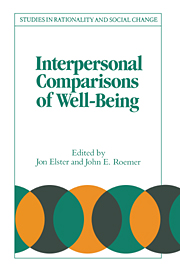Book contents
- Frontmatter
- Contents
- List of contributors
- Acknowledgments
- Introduction
- 1 The moral basis of interpersonal comparisons
- 2 Against the taste model
- 3 Utilitarian metaphysics?
- 4 Local justice and interpersonal comparisons
- 5 Notes on the psychology of utility
- 6 Adult-equivalence scales, interpersonal comparisons of well-being, and applied welfare economics
- 7 Interpersonal comparisons of utility: Why and how they are and should be made
- 8 A reconsideration of the Harsanyi–Sen debate on utilitarianism
- 9 Deducing interpersonal comparisons from local expertise Ignacio
- 10 Subjective interpersonal comparison
- 11 Utilitarian fundamentalism and limited information
- Index
3 - Utilitarian metaphysics?
Published online by Cambridge University Press: 05 June 2012
- Frontmatter
- Contents
- List of contributors
- Acknowledgments
- Introduction
- 1 The moral basis of interpersonal comparisons
- 2 Against the taste model
- 3 Utilitarian metaphysics?
- 4 Local justice and interpersonal comparisons
- 5 Notes on the psychology of utility
- 6 Adult-equivalence scales, interpersonal comparisons of well-being, and applied welfare economics
- 7 Interpersonal comparisons of utility: Why and how they are and should be made
- 8 A reconsideration of the Harsanyi–Sen debate on utilitarianism
- 9 Deducing interpersonal comparisons from local expertise Ignacio
- 10 Subjective interpersonal comparison
- 11 Utilitarian fundamentalism and limited information
- Index
Summary
Section 1
I am going to make some comparisons between interpersonal comparisons of good and intrapersonal intertemporal comparisons of good. I shall set them in the context of formal theorems that connect together these different dimensions of comparison. I hope to shed some light on the foundations of utilitarianism. Not all of utilitarianism, though; only this one part:
The Utilitarian Principle of Distribution. One alternative is at least as good as another if and only if it has at least as great a total of people's good.
Briefly: Good is the total of people's good. Utilitarians value only the total of good, regardless of whom it comes to. They do not value equality in the distribution of good. In one sense, then, they are anti-egalitarian.
It has often been suggested that utilitarianism is associated with a particular metaphysical theory of personhood: a “disuniting” theory that denies the full unity of a person over time. But I do not think the connection between utilitarianism and a disuniting metaphysics has yet been properly made out. I hope, with the help of the formal theorems, to show how one might derive the Utilitarian Principle of Distribution from a disuniting metaphysics. I shall sketch out a line of argument, though it is far from complete. I am not committed to either the Utilitarian Principle or to a disuniting metaphysics. Deriving one from the other can serve either to support the one or to weaken the other.
- Type
- Chapter
- Information
- Interpersonal Comparisons of Well-Being , pp. 70 - 97Publisher: Cambridge University PressPrint publication year: 1991
- 5
- Cited by



